From Self-taught Developer to Mobile Game Entrepreneur – An Interview with Joey Torbett
 freeCodeCamp
freeCodeCamp
By Braedon Gough
I can remember the first time I went over to Joey's house. His room was an absolute disaster as any 11 year old's room is. I made his parent's laugh after they apologized for the mess, "it's no problem," I said, "it's easier to see all of the stuff he has!"
It wasn't until after high school that we completely deviated from one another. I went off to business school, while he pursued photography, having been rejected by all post-secondary institutions he applied to.
I would have never guessed that six years later we would be on the exact same path, – both self-taught developers, but on different tracks.
I remember when Joey first told me about the games he was building in Unity. We spent countless hours playing Minecraft when we were younger, so I assumed it was something in that realm.
I was soon going on a study abroad and certainly wasn't paying much attention to his new hobby. It never occurred to me this would blossom into anything greater.
He's gone from sharing his projects on Instagram, to co-founding a company in Finland, and completely starting from scratch on his newest venture, 9 Cent Games.
I want to share his story here.
Why did you start teaching yourself game development?
I had been dabbling in Photoshop and After Effects for about a year prior. I messed up my ankle up skateboarding and had a lot of free time. My work with Photoshop led me into 3D artwork.
I started thinking, what can I do with these 3D models? I can't make animations. It's too much work. I think you need a team for that. So I was like, maybe I can code these models.
I started trying to learn with these Unity tutorials. I actually gave up a few times before it really clicked in my head. Slowly, I started accumulating knowledge, just releasing simple games, asking questions on Reddit. The community on Instagram was also very, very motivating. And then it just turned into what it is now, six years later or something. I think I started in 2014.
Unity has a whole bunch of tutorials on YouTube. There was a space shooter and then a roller ball thing. I made a little ball game called Tiles based on their rollerball tutorial. That was the first game that I made.
Why did you quit?
Oh, I honestly just didn't understand it. I had a hard time really grasping even the most basic concepts of programming. For loops, if-statements, that kind of stuff. I was using the update loop in Unity to write like a hundred if-statements as opposed to just using one for loop to do basic stuff. I had no understanding at all.
Something kept dragging me back. I made a platformer, then a little shooter and then I built a game called Aldo, which was an action RPG that had six quests and a few different worlds. I kept trying to expand my games and the thought of reaching just a little further was exciting.
And then you realize you have huge gaps in your knowledge and you don't know how to plan these projects. So you kind of have to step back. Go smaller.
 Thumbnails of the early games
Thumbnails of the early games
How did you get better at planning projects?
Honestly, studying games, looking at YouTube videos of game design breakdowns, and seeing how these games are built and the ideas behind them.
I would pick any element that I could find, replicate it and then try to make it my own in some little way. Or just straight-up, copy something and just see if I can programmatically replicate a cool mechanic.
It was all literally like hacking it together. I could show you some of the code that I wrote from way back and you would laugh.
You shared everything you did on Instagram. Why? What was that like?
Instagram was and is the number one thing for me. That's kind of how it all started as well. There is a big development community there. Specifically a game development community. Everyone shares their artwork, comments on ideas; people are generally pretty supportive.
It was very motivating. Posting kept me active and pushed me forward because it's so solo. You can feel lonely at times. You have to really be self-motivated, get up in the morning on your own for no other reason than your passion for coding.
Instagram is sort of a way to stay accountable and a way to build motivation because the reach that you get, as well as the community, are real.
I still use the same hashtags today to stay in touch with the community like #gamedev, #indiegamedev, #madewithunity, #unity3d.
Instagram actually lead to you co-founding a company, right?
Yeah, I met my future business partner on Instagram. I was posting my artwork and he started with liking some photos. My partner really liked some of the weapon designs that I was doing. He eventually DM'ed me and we started exchanging ideas.
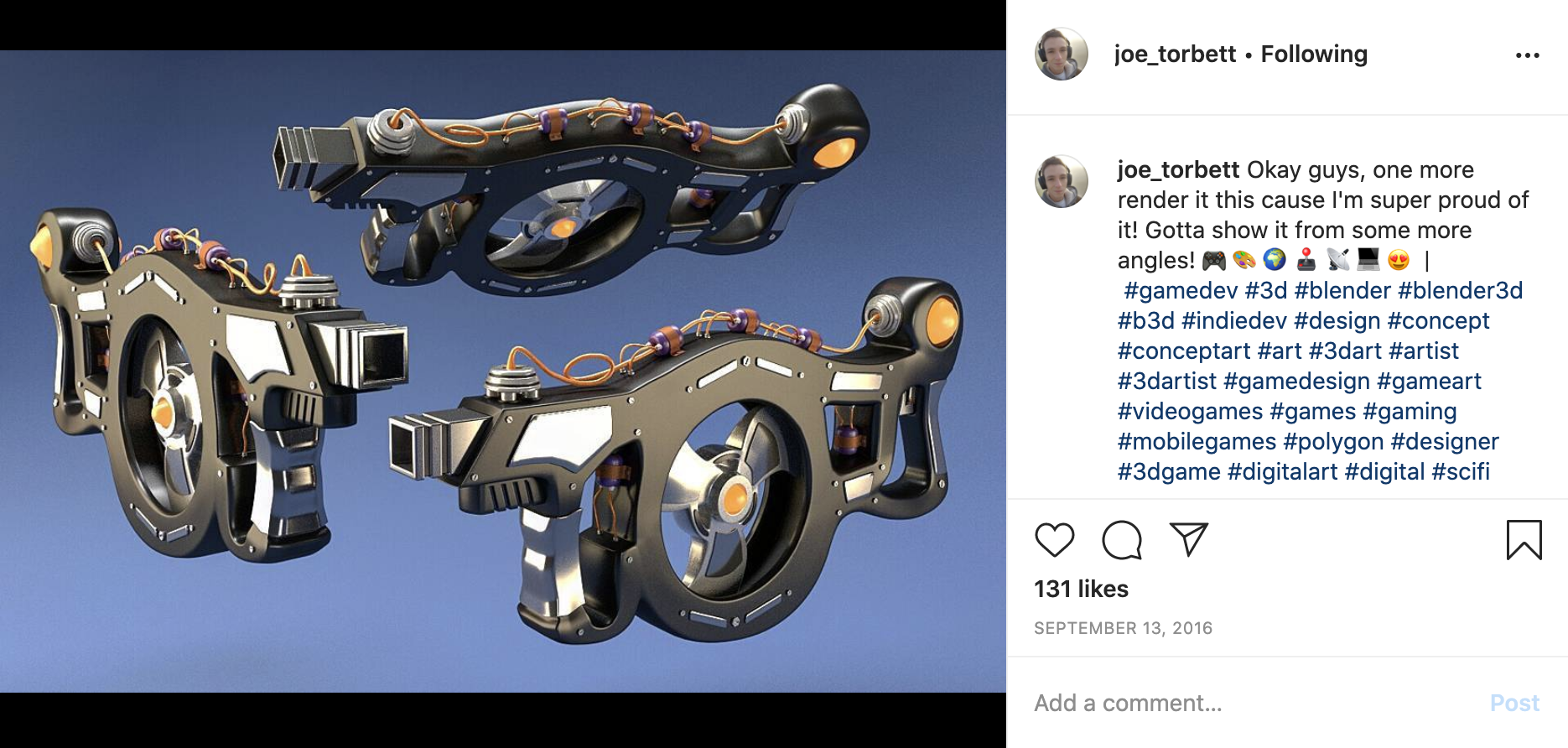
We traded ideas for a long time before I eventually bought a plane ticket from Toronto to properly meet him in Finland. It was a bit surreal. There's a massive community in Helsinki. Studios like Rovio and Supercell are based there. Finland is home to some crazy game companies.
I was starting to run before I could even walk. Soon we had our company, Action Reaction Games, and had begun planning our first game, Battle Blobs.
We just started developing the game. I had never built a multiplayer game before, so that was a bit of a hurdle. We tried all these different back end tools, all kind of worked, but kind of didn't. Every day had a new challenge. I learned about 80 percent of everything that I know now during this time.
How did you find other like-minded people to start working on the project with you?
My partner led a lot of that because he was the networking guy. I was more on the technical side of it all in those days. He led the force on that. As I said, the community in Helsinki is huge!
I think he had two engineers that he was working with to build a prototype before I joined. The fit wasn't right, so they ended up leaving. Eventually, we found an artist to work with. And then another really, really technical guy from there. All of these people he knew from his network.
At what point did it become more serious?
Around April 2018. We were just closing the funding round and that's when things really started gearing up. It was incredibly strenuous leading up to that point.
It's a lot of meetings. It's a lot of pitches. It's a lot of meeting people for no reason that barely even respond to you, even though they seem very excited in the initial meetings. I wasn't there for many of them, but I was there for enough of them. I was there for the key ones that actually landed the investment rounds. So that was cool.
 Our co-working space
Our co-working space
It is a complete grind. It's a grind of just hardcore networking and just figuring out who's really going to give you money, who actually believes in you and why am I here?
Finland's just such a hub. Money moves kind of slow there, but in a sense, it also kind of doesn't. There are tons of angel investors and venture capitalists in Helsinki focused exclusively on game investment. I don't want to name drop or anything, but we had some really cool people involved in Battle Blobs on the financial side early on.
We ended up raising about 100k euros and then the Finnish government had a program where they essentially doubled that.
How did things change after the investment?
Scheduling everything, tight deadlines, and way more meetings. We had very specific goals and needed to move much faster. The pace was much different. It was definitely an ego boost.
There was more testing, playing, trying to get the team to coordinate better, which was a big struggle. We weren't always on the same page. It's tough. You knew in your heart that someone was really backing you. You kind of felt a huge sense of responsibility on that.
I was the only one that was remote, unfortunately. Everyone else was in the office every day working on it. I would come to Finland as much as I could and be there working hands-on, but I was the only one that was remote.
It's a little bit intimidating, especially when things start to get a little bit uncertain. You know, as things evolve and develop.
What was the biggest success of Battle Blobs?
Definitely the technology we built, the software and literally just getting the game to launch. We did a really successful launch. We had fifty thousand downloads. We had no monetization mechanics, unfortunately. That was a huge oversight by us.
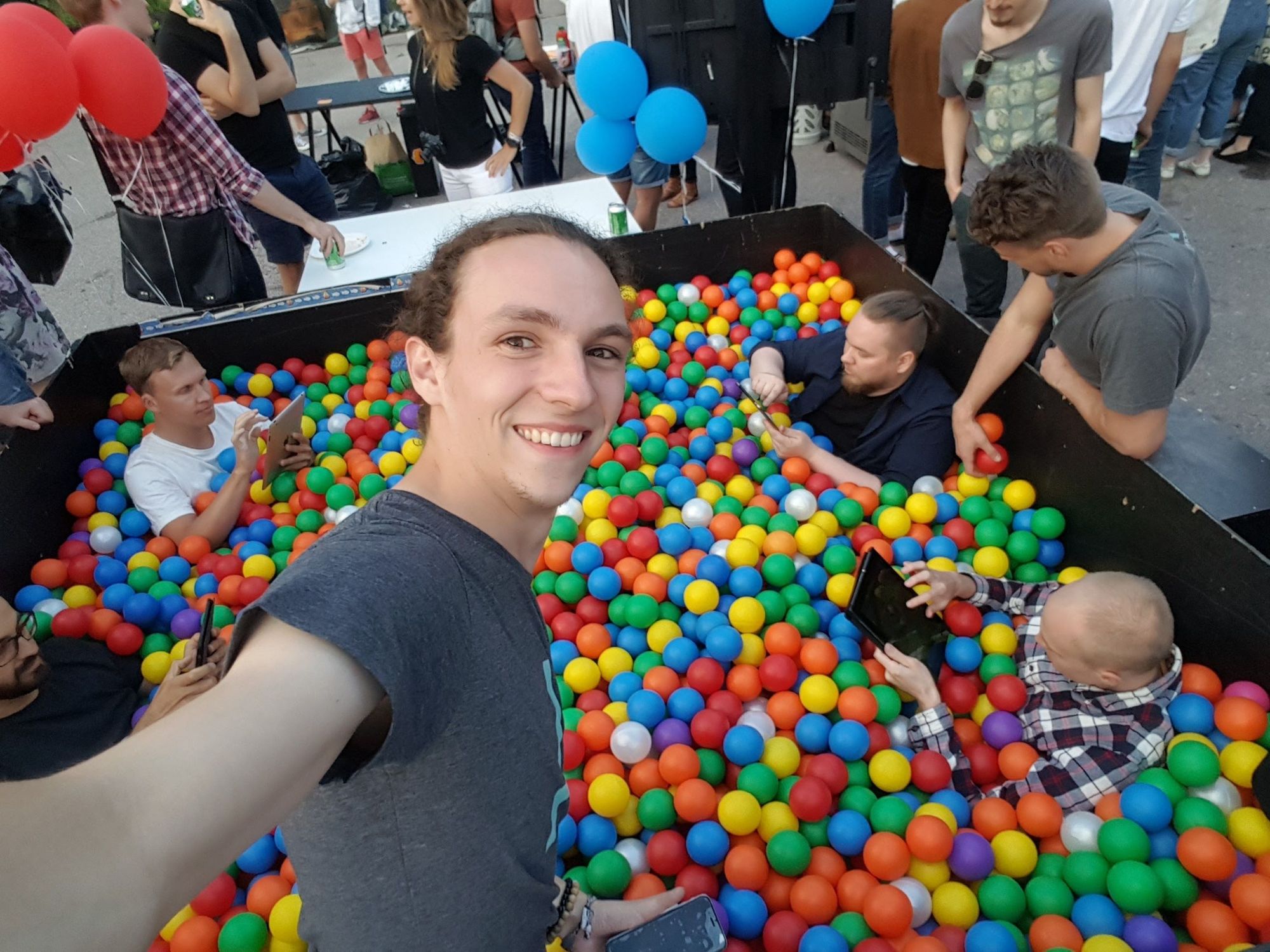 Battle Blobs launch party
Battle Blobs launch party
A lot of it was pretty organic. We did pay a company to help us with our marketing. I don't think they really helped too much. But then somehow China got a hold of it and it spiked.
It was really weird. It spiked around 15000 downloads over the course of two weeks, just randomly. We were not marketing in China at all. We were only marketing in the UK at the time. We were advised that was the best place. I question that now, but it seems that the marketing and the way our app looked right had some appeal there.
When did you start to feel like things weren't going in the right direction?
We were planning for a second investment round post-launch. Our main goal was to generate retention, generate engagement and basically just generate a high-quality product. We pushed hard to get that second funding round. We did everything we could, even pivoting the entire game into something more simple.
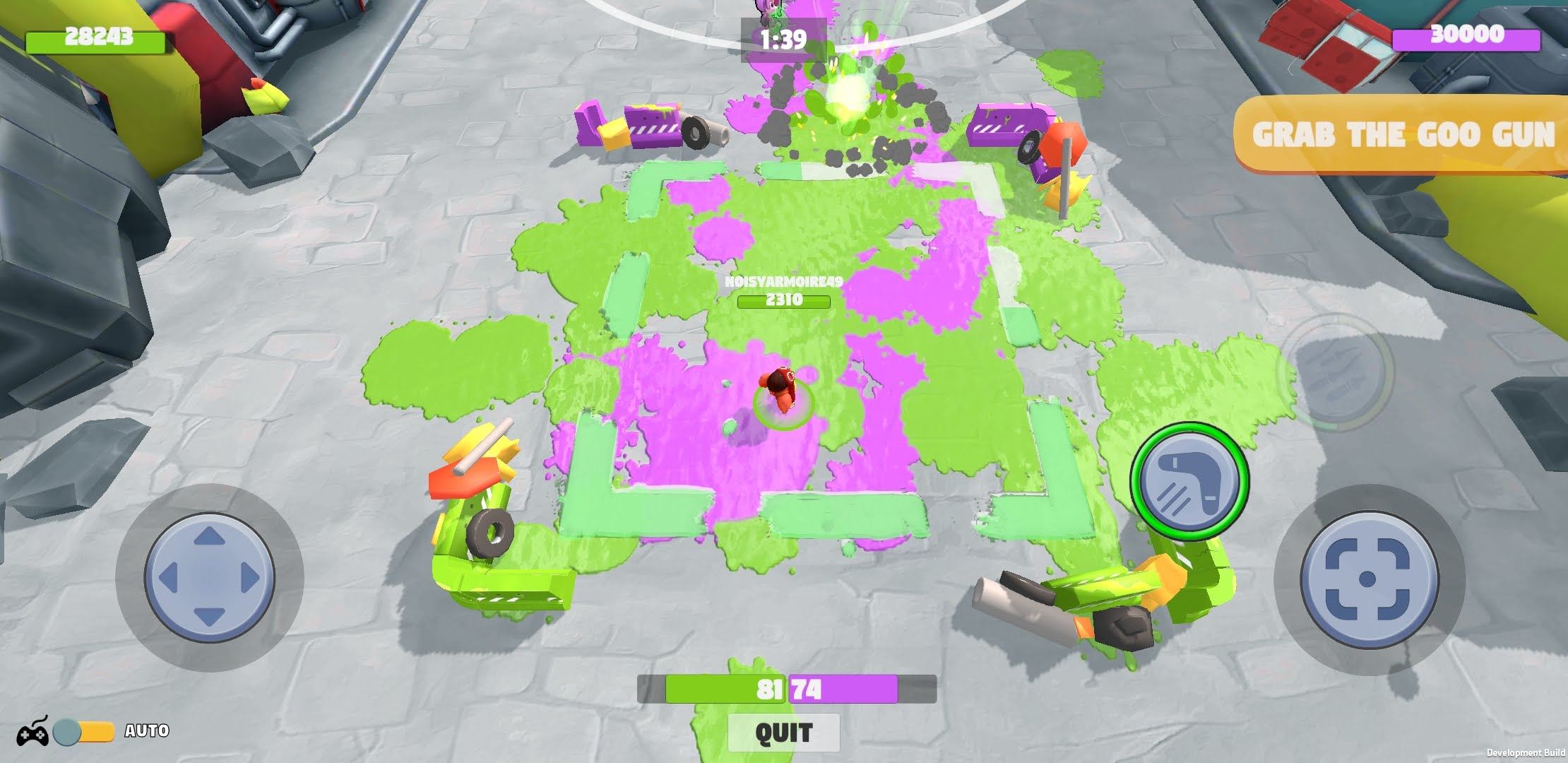 An early prototype of gameplay
An early prototype of gameplay
When that timeline starts to run down and you notice the cash flow is going down and the next thing you know, we're dropping off salaries because we want to survive a little bit longer. That's when things get pretty sketchy and you get to get a bit concerned about the whole thing of it and then you start to really question yourself.
I found I was questioning my entire viability as a co-founder. Even if we landed the funding round, could I even run this thing the way it needed to be run? I had virtually no experience running a company. It was a lot of self-doubt and strong emotions.
Being remote sucked when it was starting to crumble. It was hard to even work. I was sitting at my computer doing nothing because I had nothing to do. There was nothing to do. And we're just kind of waiting, hoping we're gonna land a funding round.
In mid-August [2019], my partner basically said, look, maybe do some damage control and find a job. If you need or do whatever you need to do. That was pretty much it.
I took a couple of weeks just totally off. I played Minecraft for two straight weeks; it was like therapy.
What happened to the company and everything that was built?
It still exists. I think it's technically still under the ownership of Action-Reaction Games. I haven't really talked to these guys in a little while, but last I heard they were trying to license it out. I haven't heard anything about that. I'm assuming it hasn't happened yet.
The technology we built was really solid. It is a full-on multiplayer video game backend. You can build any type of multiplayer game within the framework we built. It's very powerful.
To be honest, it was also very cumbersome. It can get a little bit too much and maybe we overdid it on the tech. That's really one of the biggest things - maybe we overdid it on the tech. That's where a lot of our money went, where it did not need to go. To the engineers trying to over-engineer stuff.
What were some of the biggest mistakes that you made?
There were moments of panic where I made quick decisions that I should've just took a step back, took a breath and thought about it more. My panic caused others to panic, which was a formula for disaster.
I didn't personally feel confident. I didn't have the coding experience. Our CTO was really scaling up the tech and as he was scaling it up, I was falling behind because I wasn't able to keep up.
I didn't have the knowledge. I probably still don't to be honest; it was very, very advanced. So I think that was another hurdle. I was trying to fill shoes that I couldn't really fill. I probably could've put myself in a better role within the company that would have been more productive, more successful.
I was the producer, so I had a good role, I was keeping busy. I was managing all the releases. I was making sure builds were stable. I was doing quality assurance as much as I could, even though that was a challenge on its own.
The quality assurance and the testing process that we had was not good. It was hard to get the team to test for some reason. We just never wanted to play the game.
I was always saying guys, we have to test this. We need to test this. And, you know, we would test out 2v2 or 1v1 and yeah, okay, it works functionally. The program works, but does the game work? The game is built around 3v3. We need to play this 3v3. Guys, this is releasing soon. We need to play this 3v3.
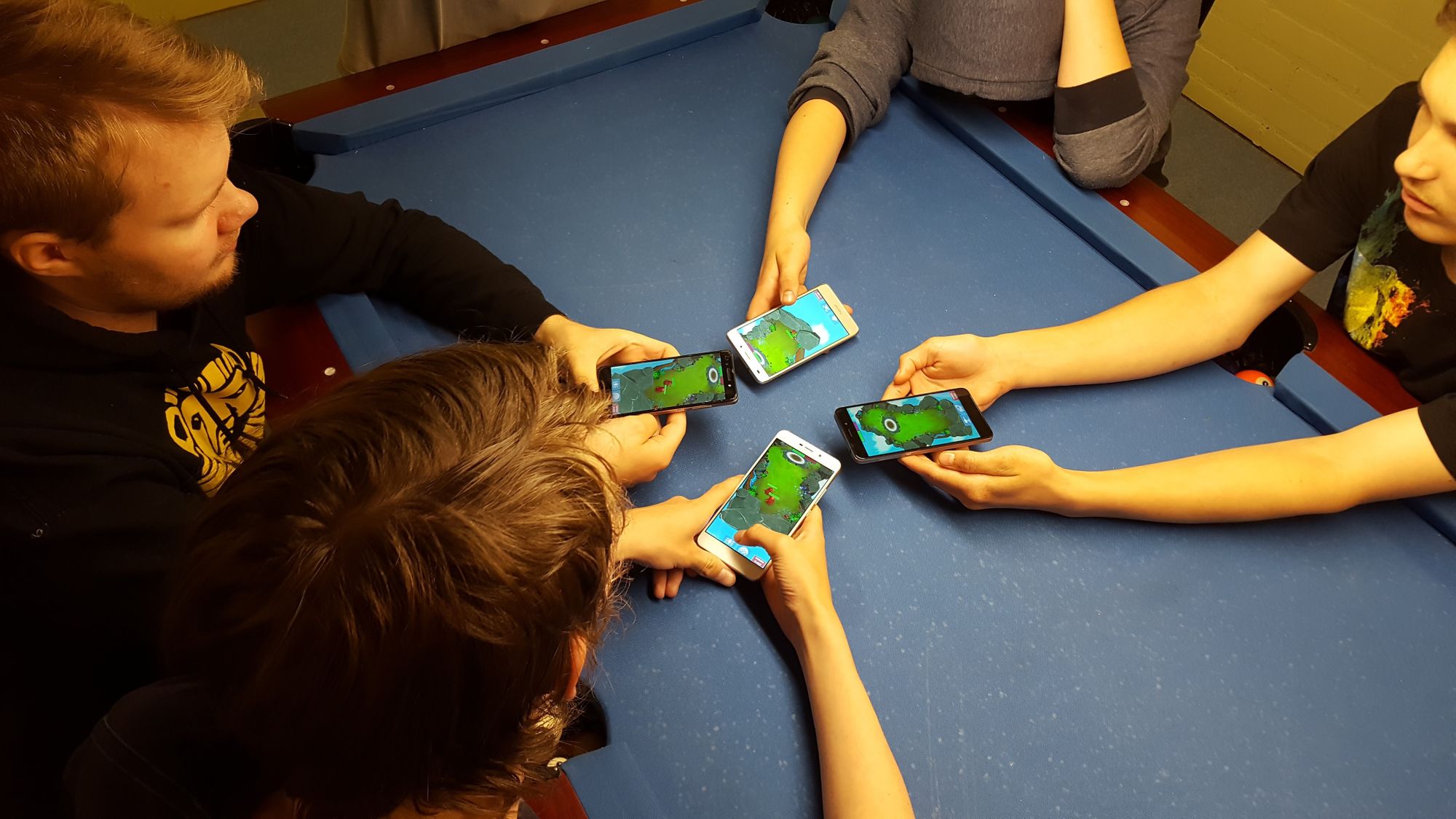 2v2 testing
2v2 testing
We never spent time making sure the game was actually fun. Like, literally sit down with a room full of people and play this thing to death until we know what we need to do. We never did that. I still don't do that with my current projects. That's another problem that I'm still facing but I'm working on that.
The biggest mistake that we made was when we landed our initial investment. We took a million dollar valuation on our pre-seed round.
If you have a million-dollar valuation on your pre-seed round and in reality, you're only worth one hundred thousand dollars. You take that money that you've got at that million-dollar valuation in order to grow into a million-dollar valuation.
When you do that, you have your original investors thinking they bought a million-dollar company and then your next investors actually get a million-dollar company and then your original investors get screwed or you're screwing the next investors because they're getting a worse deal than your previous investors got.
It creates this dynamic of an impossible to raise funding round. If we had taken a real valuation from the beginning, we probably would've landed that second round. There was real value in the end but not when we took our initial valuation.
If you could start all over again, what would you do differently?
Focus on the programming fundamentals. I would spend more time understanding software design concepts and how to scale software because you're going to build software that you can't move at a certain point because you're just not building it properly.
Eventually you'll have thousands of lines of code that's just gridlocked because it's so crap. You literally have to scrap it. I've done that. I've done that multiple times and it sucks.
If I just had better fundamentals at the beginning, we might have had a whole year head start.
I use the SOLID design principles and other similar concepts now. I think that helps a lot. You don't have to keep rewriting stuff just to get one piece of functionality working. You also encountered way less bugs and way less problems along the way.
After your two-week break, what was a turning point for starting something new?
I would think about it all the time. In the back of my head, while running Action Reaction Games, I always looked at these micro game companies, like Voodoo or POPCORE. These are super huge companies that literally make the simplest games ever. They are always top charting.
Once I took a break and I thought, ok, I could maybe try and release a game. It slowly started happening. I had this vision of a whole framework to help reduce the cost of game development. One day I woke up and thought, it's time to start.
There was also an emotional hurdle. I almost felt guilty, as if I was cheating on Action React Games by doing my own thing, which is a weird feeling. It felt like divorce. It was crazy.
It started with just seeing how fast I can get a game out. I got a game out from day one in 20 days called emoji tap. That was pretty cool. Then I re-skinned it into the Halloween version about 14 days later. So I technically launched two games within the first two months, which felt great.
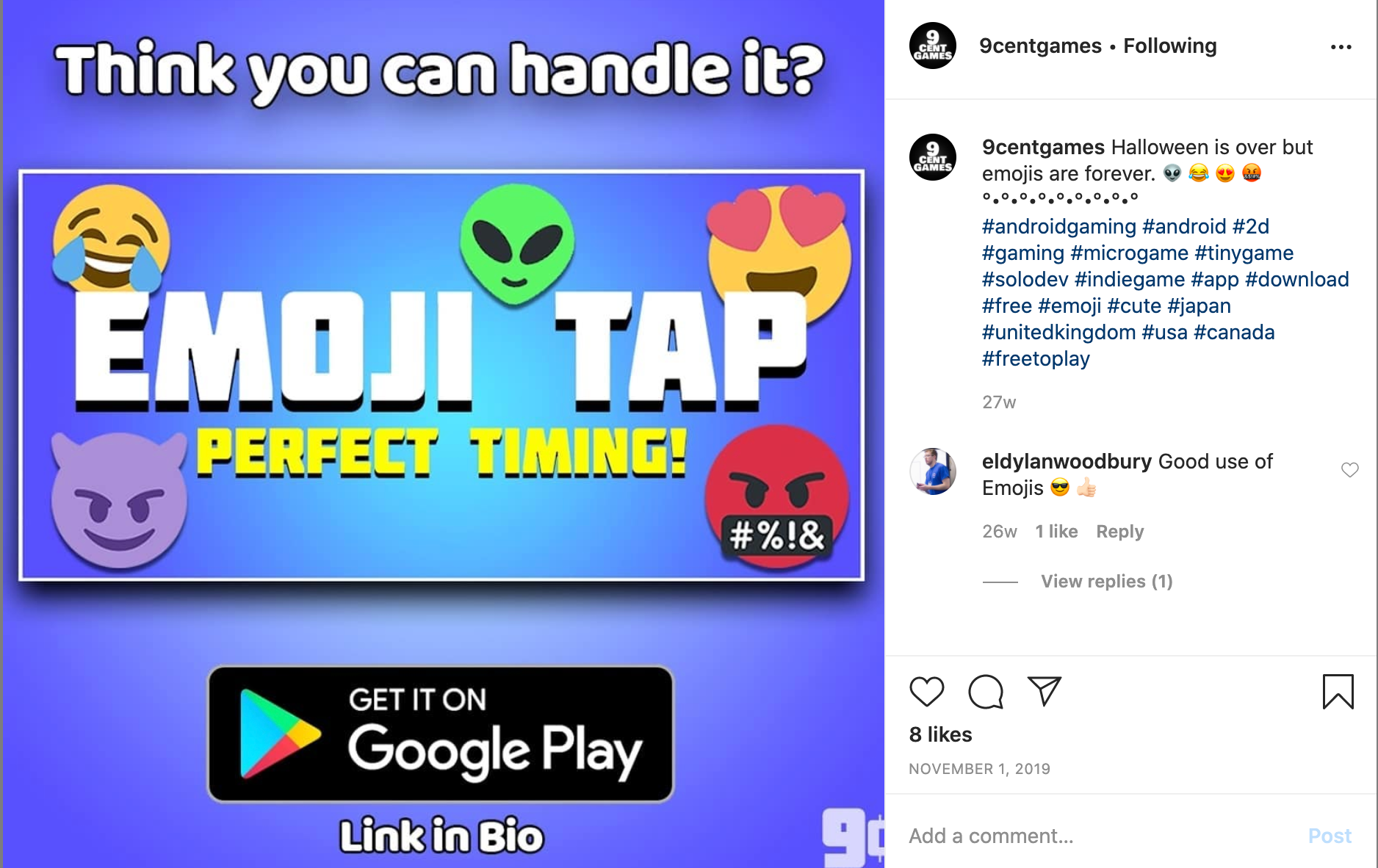 Emoji tap
Emoji tap
I think I really learned the importance of goals, deadlines and scheduling from building Battle Blobs. I also learned a lot of my programming fundamentals building a bigger project. The pace of my learning has definitely slowed, but I'm really enjoying my work right now.
What is keeping you busy these days?
My new project is officially called 9 Cent Games. I'm really focused on building out the framework, so I can quickly and easily make new games. It handles in-app purchases, ads, products and pretty much everything that you could need for a minimum-viable-product.
From there, I plan on creating games and then having the games help grow the framework. When the framework grows, the games also grow by inheritance.
I want to make sure all games built using our framework have a solid foundation for success. I want to enable developers to build quickly while also reducing the cost of development. That's the idea.
It is very mobile-focused. Everything regarding iOS and Android deployment is completely handled. It's all cross-platform. This is probably already done but it's mainly a good exercise for me to build my skills as I'm trying to do this.
I just released my new game, Germs: Virus Smash! on Android. It's never coming to iOS because Apple said no. They don't want to release any virus games during the quarantine.
I'm pivoting it into Quirks. It's a subatomic particle game. It'll be the exact same game as Germs basically, but it'll have a different skin instead.
If you want to follow Joey's journey further, you can find him on Instagram, @9centgames or @joe_torbett. You can also download all of his latest releases on Android and iOS!
Don't be a stranger! Feel free to write if you have any questions, email me your favourite book recommendations, connect with me on Linkedin or follow me on twitter!
Subscribe to my newsletter
Read articles from freeCodeCamp directly inside your inbox. Subscribe to the newsletter, and don't miss out.
Written by

freeCodeCamp
freeCodeCamp
Learn to code. Build projects. Earn certifications—All for free.